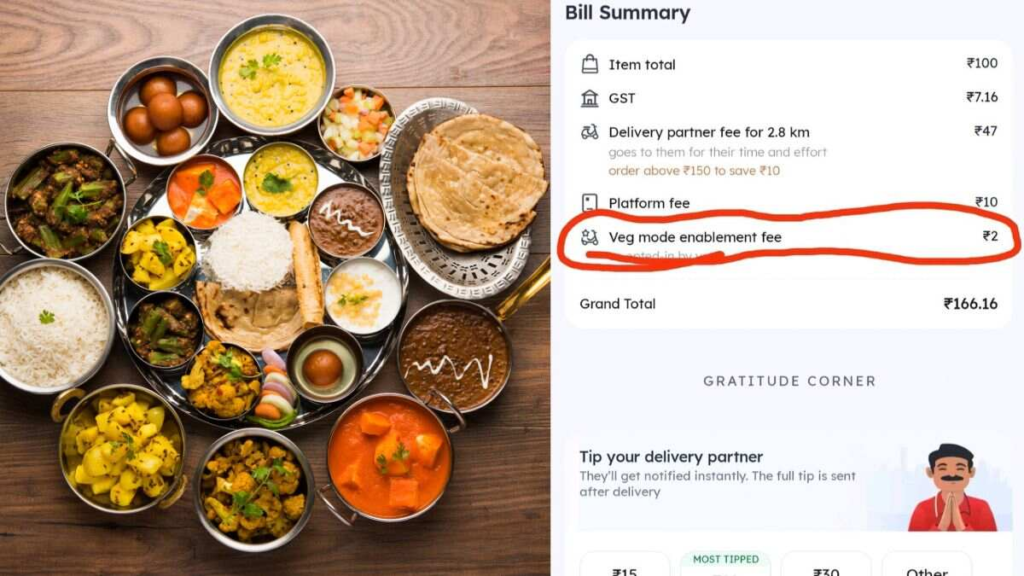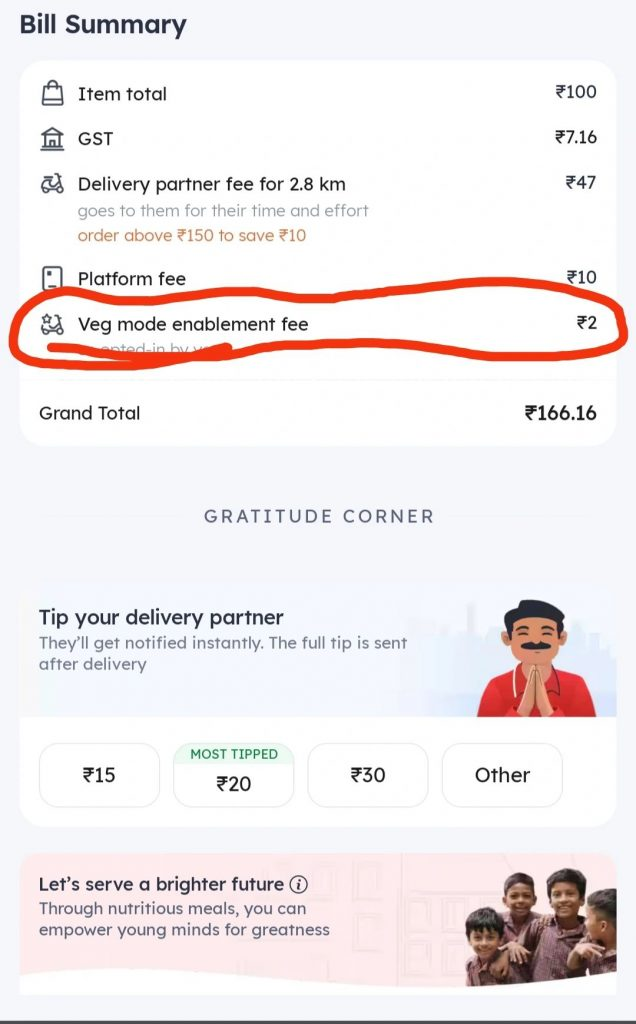Zomato CEO Deepinder Goyal recently found himself in the midst of an online uproar after a Bengaluru-based customer criticised the platform for introducing an “extra charge for the veg enablement fleet.”
The fee, which appeared on the customer’s bill for activating the “veg mode” on the app, quickly drew negative attention from social media users and sparked a wider conversation about how food delivery platforms treat vegetarian customers.
Goyal took to LinkedIn to apologise publicly for what he called a “stupid” decision, vowing to remove the charge and take corrective action.
The Controversy Behind the Veg Enablement Charge
The controversy surrounding Zomato’s new charge began with a LinkedIn post by Rohit Ranjan, a Bengaluru-based man who was visibly frustrated with the extra fee applied to his Zomato bill.
Ranjan shared a screenshot of his bill, which included a Rs 2 charge for the “veg enablement fleet.” The charge, meant to differentiate between vegetarian and non-vegetarian food deliveries, quickly became the subject of online debates.
Ranjan took to LinkedIn to express his displeasure, calling the fee a “luxury tax” on vegetarians. He sarcastically noted, “Being a vegetarian in India these days feels like a curse!” and went on to label the charge as a form of discrimination. “We’ve gone from ‘green and healthy’ to ‘green and pricey,’” he wrote, lamenting the increasing costs for vegetarian meals.
Read : Hotpot Restaurant in Sichuan Shut Down for Adding Saliva Oil to Prepare Food
Ranjan further contrasted Zomato’s actions with Swiggy, a competitor in the food delivery space, praising the latter for not imposing similar charges. His post quickly gained traction, with many other users chiming in to share their own frustrations about the fee and its implications.
Read : Who Is Grecia Munoz: The Second Wife of Zomato CEO Deepinder Goyal
The criticism quickly gained momentum on social media, with many people expressing outrage over what they saw as an unfair and unnecessary charge targeting a specific group of customers. Some even suggested that Zomato was unfairly penalising vegetarians for their food preferences, casting a shadow on the platform’s commitment to inclusivity and affordability for all its users.
Zomato CEO’s Apology and Promise to Remove the Charge
In response to the growing backlash, Zomato CEO Deepinder Goyal wasted no time in publicly addressing the issue. In a direct response to Ranjan’s LinkedIn post, Goyal acknowledged the controversy and issued a public apology for the charge.
“This is absolutely stupid on our part. I am super sorry for this,” he wrote, admitting that the decision to implement the veg enablement charge was a mistake.

Goyal’s apology was more than just an expression of regret; he also promised immediate action to rectify the situation. “This charge will be removed today itself,” he said, assuring users that the fee would be eliminated from the platform as soon as possible. The CEO also committed to ensuring that such issues would not recur in the future, pledging to take corrective steps within the company.
In his public statement, Goyal emphasised that Zomato valued its customers and their feedback, and he expressed his gratitude to Ranjan for bringing the matter to the company’s attention. The apology was well-received by many users who appreciated the swift and transparent response.
However, it also raised questions about the platform’s internal processes and decision-making, particularly concerning how customer concerns are addressed before they escalate into public controversies.
The Impact of the Controversy on Zomato’s Reputation
The episode surrounding the “veg enablement fleet” charge has sparked significant debate, not just within the food delivery industry but also in the broader context of corporate responsibility and customer relations. While Zomato’s quick response to the issue helped mitigate some of the negative fallout, the incident nonetheless highlighted important lessons for the company and others in the industry.
One key takeaway from this controversy is the importance of customer-centric policies. The introduction of a charge based on the dietary preferences of customers, without proper communication or consideration of how it might be perceived, risked alienating a significant portion of the user base.
In a country like India, where vegetarianism is a popular and culturally significant dietary choice for millions, imposing an additional charge could be seen as not only unnecessary but also discriminatory.
Zomato’s decision to issue a public apology and remove the charge has been praised by some as a demonstration of the company’s commitment to listening to its users.

However, others have raised concerns about how such decisions are made in the first place. For many, the incident suggests that Zomato’s internal policies might not have undergone thorough review before being implemented, potentially leading to avoidable controversies.
The episode has also prompted comparisons with Zomato’s competitors, particularly Swiggy, which has not introduced similar charges. While Zomato’s competitors have stayed out of the controversy, some have speculated that this incident might give Swiggy an edge in the battle for customer loyalty, as many users expressed their intent to switch to other platforms in light of the charge.
Furthermore, the controversy raised important questions about the broader issue of dietary diversity and inclusivity in the food service industry. Vegetarianism is deeply ingrained in India’s cultural and religious fabric, and charging vegetarians extra could be viewed as a violation of the principle of equal treatment for all customers.
This episode highlighted the delicate balance that food delivery platforms must strike between catering to their operational needs and respecting the cultural values of their customer base.
Zomato’s Broader Strategy for Employee Well-Being
In the same day as the apology for the controversial veg enablement fee, Deepinder Goyal made headlines for another announcement: Zomato had introduced a wellness facility at its headquarters in Gurugram.
This move, which highlights Zomato’s focus on employee health and well-being, came as a response to growing concerns about work-life balance and the mental health of employees in the tech and service sectors.
Zomato’s decision to invest in employee wellness initiatives reflects the company’s recognition of the importance of supporting its workforce, particularly during times of rapid expansion and high expectations.
While the wellness facility is unlikely to be directly related to the controversy over the veg enablement fee, it speaks to the broader trend of companies in the food service and tech sectors prioritising the health and well-being of their employees in the wake of the pandemic.

However, the two events—one concerning customer dissatisfaction and the other related to employee health—together underscore the complexity of managing a large, high-profile company. Zomato’s efforts to improve internal conditions for its staff stand in contrast to the misstep regarding its customer-facing policies.
The juxtaposition of these two initiatives reflects the need for companies to not only take care of their employees but also remain vigilant about the customer experience and the values they promote through their services.
The controversy over Zomato’s veg enablement fleet charge has prompted a public apology from CEO Deepinder Goyal and the removal of the charge. While Zomato’s swift response helped ease some of the backlash, the incident highlighted important lessons about customer-centric policies, cultural sensitivity, and internal decision-making processes.
As the company moves forward, it will be crucial for Zomato to learn from this experience and ensure that its decisions are carefully considered to prevent similar controversies in the future.
Ultimately, the incident serves as a reminder of the power of social media and customer feedback in holding companies accountable. Zomato’s ability to address the issue head-on and make amends quickly was commendable, but it also raises important questions about how businesses manage their relationships with customers and how sensitive they are to the diverse needs of their user base.

